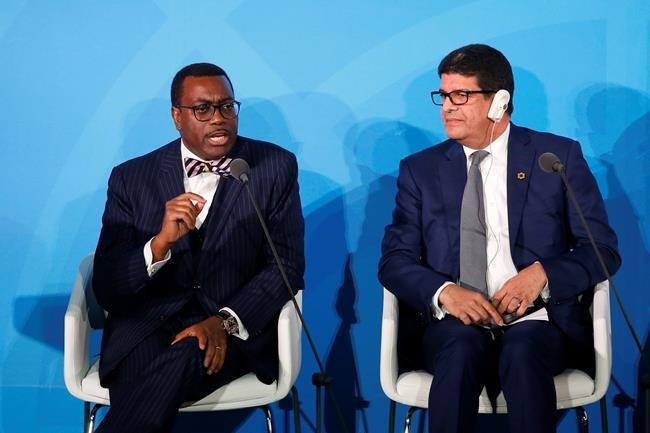
FILE - In this Monday, Sept. 23, 2019 file photo, African Development Bank President Akinwumi Adesina, left, is joined by Masen President Mustapha Bakkoury as he addresses the Climate Action Summit in the United Nations General Assembly, at U.N. headquarters. Africa shouldn't have to beg for help in addressing climate change, the president of the African Development Bank said Tuesday, Feb. 11, 2020, adding that polluting global powers "have to pay." (AP Photo/Jason DeCrow, File)
February 11, 2020 - 3:44 AM
ADDIS ABABA, Ethiopia - Africa shouldn’t have to beg for help in addressing climate change, the president of the African Development Bank said Tuesday, adding that polluting global powers “have to pay.”
Akinwumi Adesina told The Associated Press in an interview on the sidelines of the African Union summit that the financing promised to African countries to cope with the consequences of climate change “needs to be put on the table.”
Africa’s more than 1.2 billion people stand to suffer the most from global warming while contributing to it the least. The region is also the least equipped to deal with its effects, according to experts. Parts of Africa are warming at a faster pace than elsewhere, and climate experts have said warming Indian Ocean waters have contributed to more powerful cyclones and the worst locust outbreak in decades in East Africa.
African heads of state are increasingly blunt about the dangers ahead and the need for the rest of the world, including top polluters such as China and the United States, to step up and contribute to Africa’s efforts to adapt.
“There has to be climate justice,” Adesina said.
The African Development Bank is increasing its own climate financing to 40% of its total investments, he said, with such financing having doubled from $12.5 billion to $25 billion. Half of that money is for climate adaptation.
“Africa shouldn’t be in a situation wherein it is begging,” Adesina said. “We are not going to deal with climate change by talking about it.”
Africa has 15% of the world’s population, yet is likely to “shoulder nearly 50% of the estimated global climate change adaptation costs," the bank said, noting the continent has seven of the 10 countries considered most vulnerable to climate change: Sierra Leone, Nigeria, Chad, Central African Republic, South Sudan, Ethiopia and Eritrea.
And yet “to date, energy-related CO2 emissions in Africa represented around 2% of cumulative global emissions,” the International Energy Agency said last year.
“Major emitting countries and industrial sectors have a particular responsibility" to act, U.N. Secretary-General Antonio Guterres told the African Union summit. “If they don’t deliver, all our efforts will be in vain.”
When asked about South Africa, sub-Saharan Africa’s most developed economy and one of the world’s most dependent economies on coal, Adesina said the nation isn't alone in such investments.
“I always hesitate when people try to blame Africa for what others are still doing," he said. “The rest of the world has invested in coal … all the developed world has invested in coal. The issue is, it is going to take time for them and others to make energy transitions."
The African Development Bank is no longer going to “make a single dollar of investment on coal projects,” Adesina said. “But it is going to take time to wean themselves off that.” He said the bank is investing heavily in renewable energy projects in countries like Kenya and Morocco.
A collection of African civil society groups last week urged African governments to end fossil fuel development and reject further financing for such projects.
Adesina also discussed the resource-rich continent’s growth, saying that “Africa has everything it needs to become a global superpower.""
“Our work is how we can help African countries to use these blessings. We are investing heavily in projects that help nations use their resources, like in oil and gas and agriculture," he said.
One limited resource is water, and two of Africa’s most powerful nations, Ethiopia and Egypt, have been locked in a dispute over a massive Ethiopian dam project that Ethiopia says will help pull many in the country out of poverty and boost development but Egypt says will endanger its share of the Nile River waters.
The two countries, along with Sudan, are set to continue negotiations this week in Washington.
“Anywhere in the world where you have shared water resources, there are always tensions,” Adesina said. “I have every confidence that they will find mechanisms of equal sharing of this resource.”
___
Cara Anna in Johannesburg contributed.
News from © The Associated Press, 2020